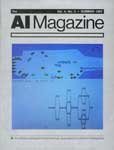The Banishment of Paper-Work
DOI:
https://doi.org/10.1609/aimag.v4i2.396Abstract
It may come as a surprise to some to be told that the modern digital computer is really quite old in concept, and the year 1984 will be celebrated as the 150th anniversary of the invention of the first computer the Analytical Engine of the Englishman Charles Babbage. One hundred and fifty years is really quite a long period of time in terms of modern science and industry and, at first glance, it seems unduly long for new concept to come into full fruition. Unfortunately, Charles Babbage was ahead of his time, and it took one hundred years of technical development, the impetus of the second World War and the perception of John Von Neumann to bring the computer into being. Now twenty years later and with several generations of computer behind us, we are in a position to make a somewhat more meaningful prognosis than appeared possible in, say 1948. We can only hope that we will not be as far off actuality as we believe George Orwell to be, or as far off in our time scale as were Charles Babbage and his almost equally famous interpreter, Lady Lovelace.Downloads
Published
1983-06-15
How to Cite
Samuel, A. L. (1983). The Banishment of Paper-Work. AI Magazine, 4(2), 31. https://doi.org/10.1609/aimag.v4i2.396
Issue
Section
Articles
License
This is an open access article under the terms of the Creative Commons Attribution License, which permits use, distribution and reproduction in any medium, provided the original work is properly cited.
Authors who publish with this journal agree to the following terms:
- The author(s) warrants that they are the sole author and owner of the copyright in the above article/paper, except for those portions shown to be in quotations; that the article/paper is original throughout; and that the undersigned right to make the grants set forth above is complete and unencumbered.
- The author(s) agree that if anyone brings any claim or action alleging facts that, if true, constitute a breach of any of the foregoing warranties, the author(s) will hold harmless and indemnify AAAI, their grantees, their licensees, and their distributors against any liability, whether under judgment, decree, or compromise, and any legal fees and expenses arising out of that claim or actions, and the undersigned will cooperate fully in any defense AAAI may make to such claim or action. Moreover, the undersigned agrees to cooperate in any claim or other action seeking to protect or enforce any right the undersigned has granted to AAAI in the article/paper. If any such claim or action fails because of facts that constitute a breach of any of the foregoing warranties, the undersigned agrees to reimburse whomever brings such claim or action for expenses and attorneys’ fees incurred therein.
- Author(s) retain all proprietary rights other than copyright (such as patent rights).
- Author(s) may make personal reuse of all or portions of the above article/paper in other works of their own authorship.
- Author(s) may reproduce, or have reproduced, their article/paper for the author’s personal use, or for company use provided that original work is property cited, and that the copies are not used in a way that implies AAAI endorsement of a product or service of an employer, and that the copies per se are not offered for sale. The foregoing right shall not permit the posting of the article/paper in electronic or digital form on any computer network, except by the author or the author’s employer, and then only on the author’s or the employer’s own web page or ftp site. Such web page or ftp site, in addition to the aforementioned requirements of this Paragraph, must provide an electronic reference or link back to the AAAI electronic server, and shall not post other AAAI copyrighted materials not of the author’s or the employer’s creation (including tables of contents with links to other papers) without AAAI’s written permission.
- Author(s) may make limited distribution of all or portions of their article/paper prior to publication.
- In the case of work performed under U.S. Government contract, AAAI grants the U.S. Government royalty-free permission to reproduce all or portions of the above article/paper, and to authorize others to do so, for U.S. Government purposes.
- In the event the above article/paper is not accepted and published by AAAI, or is withdrawn by the author(s) before acceptance by AAAI, this agreement becomes null and void.

